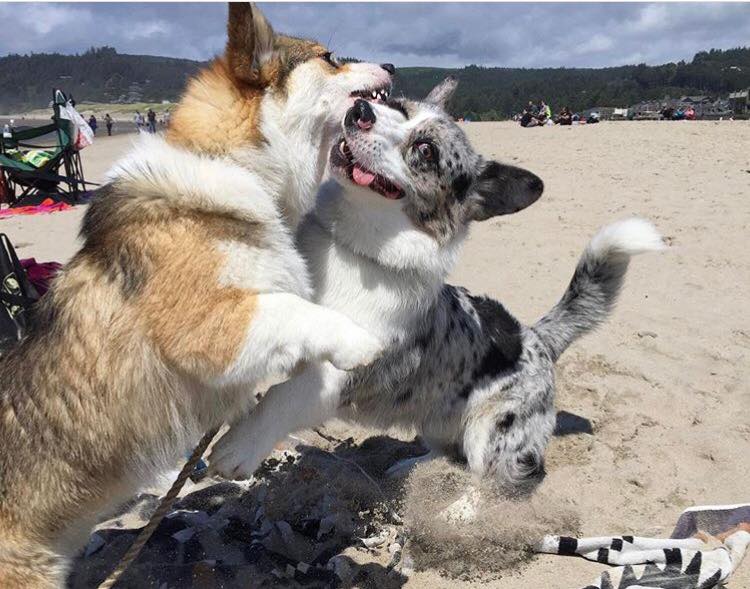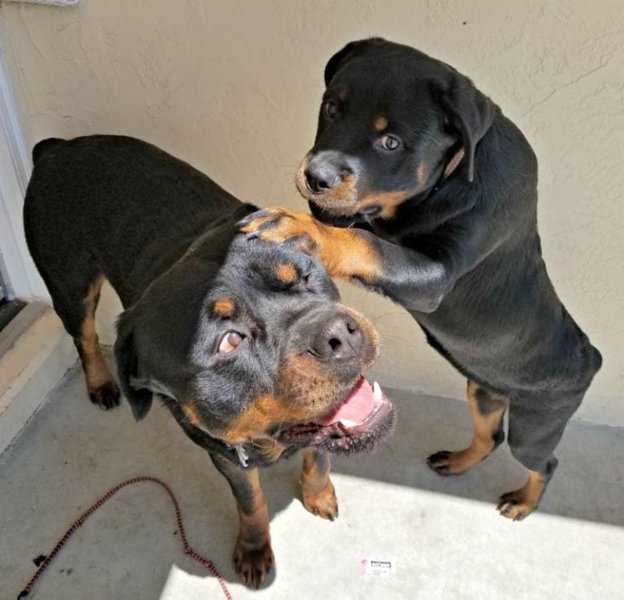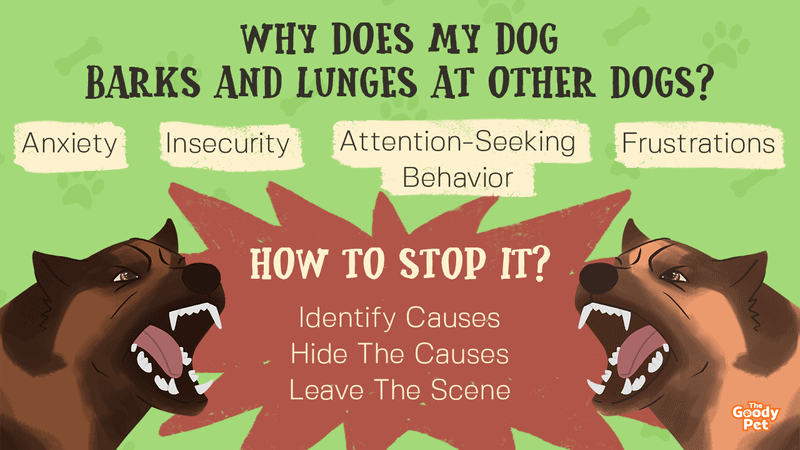It can be an unpleasant experience when your dog starts to develop the habit of barking and lunging at other dogs. I’ve been there before, and, thankfully, regardless of how exasperating it can be, uncontrolled barking and lunging can be corrected by following appropriate steps.
But why does a dog bark and lunge at other dogs? A dog barks and lunges at other dogs mainly because of anxiety, insecurity, frustrations, and attention-seeking behavior. Sometimes, it can also be an act of playfulness to interact with the other canines, where they do not mean any harm or aggression at all.
Nonetheless, it is important to know that the act itself, of a dog barking and lunging at other dogs, is known as reactivity. Reactivity in dogs is quite common, and, most importantly, it is a habit that can be corrected. We will explore how to stop your dogs from barking and lunging at other dogs in a bit, but first, let us take a closer look at why they do so.
Why Do Dogs Bark At Other Dogs?
The general reasons dogs bark at other dogs, as mentioned, are anxiety, frustration, insecurity, and attention-seeking. Sometimes two or more of these reasons work hand in hand.
So how do you tell which particular reason applies to your situation?
Well, one specifically important factor to consider to understand why your dog barks non-stop is the condition surrounding the act in the first place.
For instance, why does a dog bark at other dogs walking by the house?
The answer to this may be due to territory, a sort of declaration by your dog that says “get off my lawn”, or “this is my house”.
Then there’s the question of a dog barking at other dogs while on a leash. This, too, is usually down to anxiety.
You see, while on a leash, a dog has limited options when faced with unfamiliar situations.
Off-leash, it is easier to deal with these situations by running away.
On a leash, however, the reaction range becomes limited, and many dogs choose to deal with it by being on the offensive, either by barking or growling at other dogs.
Then, of course, a dog may just happen to be easily scared by other dogs, which, in turn, causes inordinate fear that is expressed through barking and lunging.
It is also worth keeping in mind that just because your dog growls at other dogs while on a leash does not mean that your dog is aggressive.
In fact, sometimes it is quite the opposite and just shows how friendly the doggie is.
Why Does My Dog Lunge At Other Dogs?

As for the question of a dog lunging at other dogs, the reasons for this are also quite similar.
You see, while some dogs deal with their feelings through barking and growling, some take it further by lunging.
And again, before I proceed as to why this is done, it is imperative to understand that this is not necessarily due to aggressiveness.
It should interest you to know, as a matter of fact, that your dog is most likely lunging at other dogs because it wants to play.
This isn’t so difficult to believe when you really think about it.
Once a dog is on a leash, there is already a host of restrictions in place. Not only in terms of movement, mind you, but also in terms of expression and socialization.
So while under normal, non-restrictive circumstances, a dog might be able to say hi to another dog without barking and lunging.
But once a leash comes into play, well, the only available option becomes barking and, for dogs who get excited enough, lunging.
Of course, lunging can also be a result of the general reasons highlighted above, which are anxiety, and attention-seeking.
Just as your furry friend begins to lunge when unable to go say hi to another dog the normal way, it can also start to do the same if it somehow feels threatened by other dogs.
In short, depending on the nature of your pooch and how excited it gets, barking and lunging may be as much a product of frustration as they are a product of anxiety.
How To Stop My Dog Barking When Out Walking?
Now that you know why your dog barks and lunges at other dogs, the next and most important thing to figure out is how to stop the behavior from continuing.
Well, luckily, this isn’t at all an impossible task to achieve, and some might even call it simple as long as you know what you’re doing and follow the instructions properly.
Identify Causes
The first way to go about this is to recognize what causes your dog to get so excited in the first place and do your best to avoid it. For example, for some dogs, it is the presence of cars, bikes, and other dogs in the distance, close range, and so on.
Hide The Causes
Once you understand what it is exactly that sends them into vigorous barking, the next thing to do is shield them from exposure to these things.
This may involve changing the time of your walks or changing the route altogether.
It will also definitely involve more attention on your part. It will involve paying more attention to your dog and to your surroundings to identify these “threats” so that you can shield your pooch in time.
Exposure…Maybe?
Now, some would advise the opposite – exposure. The logic behind this is to let the dog get used to these “threats” and, therefore, they would not bark and make any fuss about them.
Sadly, this isn’t a very appropriate response.
Exposure will cause them more pain and frustration. Instead of doing so, it is usually more effective to let things go and adjust accordingly.
Plus, there is absolutely no guarantee that exposure will work, whereas if you do it right, avoiding the triggers will definitely give the intended result.
How Do I Stop My Dog From Lunging At Other Dogs?

A dog lunging at other dogs, as mentioned earlier, is mostly related to frustration. This can also be looked at from two different perspectives.
The first is from the perspective of a dog that lunges at other dogs while on a leash, and the second is that of a dog who does the same even without a leash.
The first case is usually more common and easier to handle.
First of all, the triggering scenario has been fully recognized. And, as noted earlier, lunging is usually born from the frustration of not being able to react to the presence of another dog as it would have in a scenario where there was no restriction.
To solve this problem, the first thing you should do in any case is to find a way to de-escalate the situation by leaving the scene as quickly as possible – even before the lunging starts, if possible.
This, of course, will require you to pay attention and identify the situation before it even occurs.
Another option is to make use of treats towards the same end.
Some dogs just can’t avoid the lure of treats, and will always choose to eat, even in the middle of lunging and barking.
If your pooch belongs to this category, then you should make sure to always have a bag of treats with you to make use of when such situations arise.
You can throw the treat on the ground in the opposite direction and make her find it for more efficiency.
Both of these options are also viable for off-leash barking dogs, along with the additional option of training them to ignore other dogs entirely.
How To Train Your Dog To Ignore Other Dogs?
By training your dog to ignore and walk around other dogs, you are effectively taking away the anxiety and frustrations, thereby stopping the barking and lunging altogether.
But how do you train your dog to walk around other dogs and ignore them entirely? Well, there are a couple of options to consider.
Firstly, you could choose to train your dog to be less emotional and reactive to other dogs by paying a visit to a dog behavior consultant.
These are experts who are not only familiar with over-reactive dogs but who also have a ton of experience training dogs in finding U-turns, learning the “something good is about to happen” principle, and other techniques to ignore other dogs in general.
Then there are also a lot of games and behavioral treatments that may not necessarily be easy for you to pull off but which would be a breeze for an expert consultant to teach your furry friend.
In case you don’t want to follow this route, you can also train your dogs in the art of ignoring other dogs by teaching the “something good is about to happen” principle. This is a method of letting your dog know that whenever a dog walks by, something bad is not going to happen, but instead, something good and rewarding will happen.
You do this by walking with your dog and giving a treat as a reward immediately after you come across another dog and stopping the treat once the dog passes or your dog leaves the scene.
Related Questions
What Is The Most Jealous Dog Breed? Some of the most jealous breeds of dogs include the English Springer Spaniel, French Bulldog, Labrador Retriever, American Pitbull Terrier, Golden Retriever, Brussels Griffon, German Shorthaired Pointer, and the Boston Terrier, in no particular order. The Siberian Husky is an honorable mention.
How Do You Calm An Over Excited Dog? You should calm an excited dog down by providing outlets such as hidden treat games and interactive toys, and also through patience and rewarding calm behavior.
What Do You Do If An Off-Leash Dog Approaches Your Dog? The first thing to do in this scenario is to stay as calm as possible. Your dog takes cues from you, and this is an important one to send. Make sure you watch out for your dog, getting between them if you can, and have treats ready as a form of distraction.





